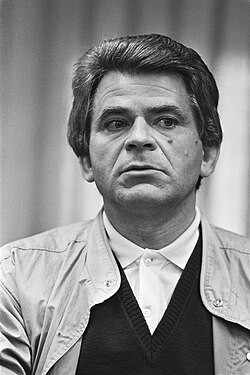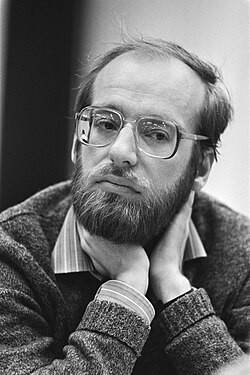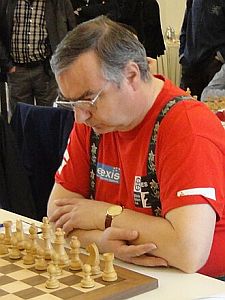 |
Obituary |
Former World Champion Spassky passes away (1937-2025)

The 10th Classical World Champion Boris Spassky passed away on 27-Feb-2025 at the age of 88.
He was a two-time (1961, 1973) Soviet Champion and became World Champion after beating "Iron" Tigran in 1969, earlier losing the first match in 1966. In the first match, Spassky lost a keenly fought match to Petrosian in Moscow, with three wins against Petrosian's four, with seventeen draws. In the second match again in Moscow, he triumphed over Petrosian 12½ to 10½.
He later lost the world championship match to Bobby Fischer in 1972 in the so-called "Match of the century".
The contest took place in Reykjavík, Iceland, at the height of the Cold War, and consequently was seen as symbolic of the political confrontation between the two superpowers. Spassky accommodated many demands by Fischer, including moving the third game into a side room. The Fischer vs Spassky World championship was the most widely covered chess match in history till then, reported upon by mainstream media throughout the world. Secretary of State Henry Kissinger spoke with Fischer urging him to play the match, and chess was at its apex.
In the runup to the match, Fischer had never won a game from Spassky in five attempts, losing three. In addition, Spassky had secured Geller as his coach, who also had a plus score against Fischer.
Despite the popular accounts of Fischer as a remorseless, unbeatable machine, there were a slew of interesting, hard-fought games played in Reykjavik, and Spassky missed several chances during the match to narrow the gap.
The match could be divided into two halves, the first won convincingly by Fischer, and the second a close battle.
Fischer famously began the match with Spassky - whom he had never beaten before - with a 0-2 score, with an inexplicable endgame blunder in the first game and a forfeit over match conditions in Game 2. The third game, played in a small back room away from the crowds at Fischer's insistence, thus proved a turning point, with Black using a stunning opening innovation in a Modern Benoni, 11. Qc2 Nh5!? 12. Bxh5 gxh5, that rattled White and induced nervous and uncertain responses from Spassky.
Having finally beaten his great Russian rival, Fischer stepped on the gas, with four wins and four draws in the next eight games to essentially decide the contest.
Spassky's sportsmanship was evident when he applauded Fischer along with the audience in Game 6.
In the string of draws in the second half of the match, it was often Fischer who had to work hard to save difficult positions and preserve his lead. One of Fischer's greatest accomplishments in the match was the fact that he never "lost" an adjournment, able virtually on his own to find the most accurate continuations while an army of top Soviet grandmasters was enlisted to help Spassky. "Basically," admitted Soviet Chess Sports Committee head Viktor Baturinsky, "the Soviet leadership and the powers that be in sport were interested in just one issue: how to stop Fischer from becoming world champion."
In the final Game 21, Fischer had the black pieces when he produced one of the most important novelties in a variation of Sicilian defense, he had never shown any liking for, and gained a distinct advantage. However, just when Bobby seemed to be succeeding in the struggle, Boris came up with a finely judged Exchange sacrifice which should have left little question about the draw. Unfortunately for him, he then blundered monstrously, throwing away the fruits of his intrepid defense. When the game was adjourned, Spassky sealed a losing move, 41.Bd7. The next day, September 1st, 1972, Spassky resigned by telephone. At 2:35 pm Chief Arbiter Lothar Schmid congratulated Fischer and announced in the hall that Bobby was the new champion.
Thus, Fischer won the title match 12½ to 8½ (+7−3=11), ending the Soviet Union's quarter-century stranglehold on the title and set off a chess boom in the rest of the world.
Spassky emigrated to France in 1976 and became a French citizen in 1978. He continued to compete in tournaments, but was no longer a major contender for the world title. Spassky lost an unofficial rematch against Fischer in 1992. In 2012, he left France and returned to Russia.
He was a World Chess Championship candidate on seven occasions (1956, 1965, 1968, 1974, 1977, 1980, 1985). In addition to his Candidates wins in 1965 and 1968, Spassky reached the semi-final stage of the championship in 1974 and the final stage in 1977.
Spassky played five times for the USSR in Student Olympiads, winning eight medals. He scored 38½/47 (+31−1=15), for 81.91 percent performance.
Spassky played twice for the USSR in the European Team Championships, winning four gold medals. He scored 8½/12 (+5−0=7), for 70.83 percent performance.
Bobby Fischer once wrote that "Spassky sits at the board with the same dead expression whether he's mating or being mated. He can blunder away a piece and you are never sure whether it's a blunder or a fantastically deep sacrifice."
Arkady Dvorkovich, the president of FIDE, summed up the Chess world's assessment of this great player: “He was not only one of the greatest players of the Soviet era and the world, but also a true gentleman. His contributions to chess will never be forgotten.”
The following games are to be found in the panel below:
- Bent Larsen vs. Boris Spassky, Belgrade 1970 (match USSR vs Rest of the World), Nimzo-Larsen Attack, Modern Variation (A01), 0-1
- Anatoly Karpov vs. Boris Spassky, Candidates' match, Leningrad 1974, game 1, Sicilian Defense, Scheveningen Variation (B83), 0–1
- Boris Spassky vs. Bobby Fischer, Siegen Olympiad 1970, Grunfeld Defense, Exchange Variation (D87), 1–0
- Boris Spassky vs. David Bronstein, USSR championship, 1960, King's Gambit Accepted, Modern Defense (C36), 1–0
- Averbakh, Y. vs. Spassky, B. - Leningrad (1956) ½-½
GM Robert Hübner passes away (1948-2025)

He became the youngest GM from Germany in 1971. Between 1971 and 1991, Hübner played in four Candidates Tournaments for the World Championship.
Three of them ended in controversial circumstances as follows:
- In 1971, he forfeited a closely contested quarter final to Tigran Petrosian. After 6 draws, he blundered a piece in the 7th game in a drawn position. He then abandoned the match, disturbed by the noise in the tournament hall.
Ambar Chatterjee adds:
The quarter final candidates' match was played in Seville, Spain. Robert Hübner was a relative newcomer, at the time.Before play began, virtually everybody had predicted that Petrosian would make short work of the inexperienced Hübner, whose qualification for a place among the candidates was a surprise. So, the result of the first six games (six draws) was a mild sensation.
In most of the games, Petrosian had the advantage, but Hübner exhibited considerable ingenuity and tenacity to hold his dangerous rival. When Petrosian finally broke through and won the seventh game, Hübner withdrew from the match, complaining that the heat and the noise made by the enthusiastic and irrepressible Spanish spectators had brought him to the verge of nervous collapse.
Did not the noise affect both players equally? No! Petrosian, who was 80% deaf, simply switched off his hearing aid!
- In 1980–81, his best result, after winning the quarter-final (against the Hungarian GM Adorjan) and semi-final (against the Hungarian GM Portisch), he reached the final before losing to Viktor Korchnoi. The 16-game match was also abandoned by Hübner after 10 games. He was just down 1 point. The key game of his career was the 7th game which he lost after blundering a knight fork.
- In 1983, he lost a quarter final to Vasily Smyslov in one of the most intriguing circumstances: with the match tied after the original 10 games plus 4 further games, the 7-7 tie was resolved (in Smyslov's favour) by a spin of a roulette wheel in a local casino! Something like this is unimaginable today!
Immediately after losing the Candidates, he did beat Petrosian at the Chess Olympiad in Skopje in 1972 where Hübner won the gold medal for Board 1 with an undefeated score of +12=6-0.
He became world #3 behind Karpov and Korchnoi in 1979.
In his final Candidates match in 1991, he lost to Netherland's Jan Timman in his first round match.
- He served as a second to Nigel Short in the 1993 PCA World championship match against Garry Kasparov.
- In 2000 he won, with the German team, a silver medal in the 34th Chess Olympiad in Istanbul.
The Hübner variation of the Nimzo-Indian Defence is named after him: 1.d4 Nf6 2.c4 e6 3.Nc3 Bb4 4.e3 c5 5.Bd3 Nc6 6.Nf3 Bxc3+.
Curiously, Hübner was known as one of the world's best xiangqi (Chinese chess) players, not from China. He reportedly spoke 22 languages.
The panel below contains the following games:
- Robert James Fischer vs. Robert Hübner, Palma de Mallorca iz 1970, Caro-Kann defense: King's Indian attack, B10 ½–½
- Huebner Robert vs. Petrosian Tigran, Candidates, Seville 1971, B82 (0-1)
- Huebner Robert vs. Petrosian Tigran, Olympiad-20, Skopje, 1972, B42 (1-0)
- Huebner Robert vs. Korchnoi Viktor, Candidates, Merano, 1980, C08 (0-1)
- Huebner Robert vs. Korchnoi Viktor, Interpolis tournament, Tilburg,1987, C82 (1-0)
- Huebner Robert vs. Kasparov Garry, Dortmund, 1992, King's Indian defense, Fianchetto variation E69 (1-0)
Peter Enders passes away (1963-2025)
